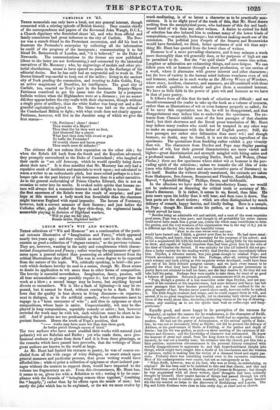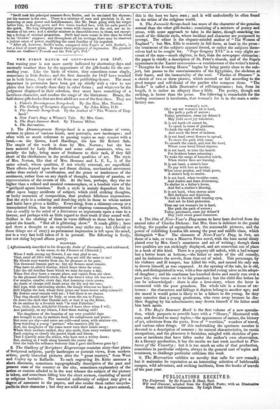LEIGH WENT'S WIT AND REMOVE.
Tinto selections of "Wit and Humour" are a continuation of the poeti- cal extracts illustrative of "Imagination and Fancy," which appeared nearly two years ago ; and they exhibit as much care in the choice, and contain as good a collection of "elegant extracts," as the previous volume. They are, however, wanting in the unity and completeness which charac-
terized Imagination and Fancy; rather wearing the appearance of speci- mens upon a general subject than possessing an added interest from the critical illustrations they afford. This was in some degree to be expected
from the nature of the topic. Wit, critically speaking, is brief—the pro- verb which declares brevity its soul is a canon, though Mr. Hunt seems to doubt its application to wit more than to other forms of composition.
The brevity is essential nevertheless. Imagination, fancy, passion, will all bear accumulation—may possibly require it ; but wit proper does its work at a blow ; a second image may be borne, but anything beyond diverts or encumbers. Wit is like a flash of lightning—it may be re- peated, but it cannot be fixed, without ceasing to be a flash. It fol- lows that the quality is best shown in living discourse—in repartee; next in dialogue, as in the artificial comedy, where characters meet to engage in a "keen encounter of wits " ; and then in epigrams or short compositions, whose basis is satire. Unquestionably, wit may be dis- played in long compositions, especially comedy or satire ; but, however crowded the work may be with wit, each witticism must be short in it- self. And if points are too predominating the book suffers in more im- portant features. Hence the truth of Pope's position, that
"— works may have more wit than does them good,
As bodies perish through excess of blood."
The two authors who have most studded their works with natural (not pedantic) wit are Rabelais and Butler ; yet who reads them save pro- fessional students to glean from them ? and it is from these gleanings, or the remarks which have passed into proverbs, that the writings of those great authors are known to the world at large.
As Mr. Hunt had limited his extracts to poetry, he was of course ex- cluded fiom all the wide range of witty dialogue, or smart attack upon general manners and particular persons, that prose writing would have afforded him ; while to print a collection of epigrams or short isolated pas- sages without the context to support them, would have imparted to the volume too fragmentary an air. From this circumstance, Mr. Hunt has, it seems to us, given too wide a definition to wit ; testing it by its com- pliance with the formula of "bringing remote ideas together," (omitting the "happily,") rather than by its effects upon the minds of men : but surely the joke which has to be explained, or the wit we mast evolve by
much meditating, is of so latent a character as to be practically non- existent. It is no slight proof of the truth of this, that Mr. Hunt draws nothing from the metaphysical poets, who had more of this dry and hard- bound kind of wit than any other writers. A desire to extend his field of selection has also induced him to embrace many of the lower kinds of composition,—as parody, burlesque; but without making much use of the extension. The political jeux d'esprit of the Stuarts and Brunswicka would have fitrnished, we think, better specimens of acid wit than any- thing Mr. Haut has quoted from the lower class of writers.
Humour is of a more pervading character, and it may animate a work more thoroughly than wit generally does, or for purposes of high art can be permitted to do. But the "ne quid nimis " still comes into action. Laughter or admiration are exhausting things, and soon fatigue. We can follow pure wit or humour through a short production, or one section of a work, where it alternates with graver interest and other characters ; but the love of variety in the human mind induces weariness even of wit and humour, unless as in such works as the Merry Wives of Windsor, where story, incident, character, and manners, are all combined with those more subtile qualities to embody and give them a sustained interest. We have as little faith in the power of pure wit and humour as we have in that of pare poetry.
It follows from all this that the task of selection was difficult : and we should recommend the reader to take up the book as a volume of extracts, rather than as illustrations of wit or even humour properly so called ; for if he carry this expectation too far, he will be disappointed, and that disappointment may induce him to undervalue the specimens. The ex- tracts from Chaucer exhibit some of the best passages of that obsolete bard ; but their shortness and the literal prose translation of Mr. Hunt may induce many readers who could not be tempted in any other way to make an acquaintance with the father of English poetry. Still, the best passages are rather nice delineation than mere wit; and though humour, no doubt, may be found, it is not the main ingredient of the specimens. The quotations from Suckling rather exhibit a gay vivacity than wit. The characters from Dryden and Pope may display passing touches of wit, but their general characteristics are more varied and higher—great discrimination and strength mingled with biting satire and a profound moral. Indeed, excepting Butler, Swift, and Wolcot, (Peter Pindar,) there are few specimens where either wit or humour is the per- vading spirit of the selections ; unless we transfer the old idea of wits (men who followed the lighter and more inventive parts of literature) to wit itself. Besides the writers already mentioned, the extracts are taken from Shakspere, Ben Jonson, Beaumont and Fletcher Randolph, Broome,
Marvel, ,c Splendid " Phillips, Green, and Goldsmith.
In the allusions we have made to the introductory Essay, we would not be understood as disputing the critical truth or accuracy of Mr. Hunt's discourse. It is rather, it seems to its, freed, than false. He puts more upon his hobby than it will bear, and then runs it down. The best parts are the short notices ; which are often distinguished by much delicacy of remark, happy fancies, and kindly feeling. Here is a sample, in Pope ; though Mr. Hunt omits his pathos, or at least a tenderness which served its turn.
"Besides being an admirable wit and satirist, and a man of the most exquisite good sense, Pope was a true poet; and though in all probability his entire nature could never have made him a great one, (since the whole man contributes to form the genius, and the very weaknes of his organization was in the way of it,) yet in a different age the boy who wrote the beautiful verses • Blest be the man whose wish and care,' would have turned out, I think, a greater poet than he was. He had more sensi- bility, thought, and fancy, than was necessary for the purposes of his school; and he led a sequestered life with his books and his grotto caring little for the manners he drew, and capable of higher impulses than had been given him by the wits of the time of Charles the Second. It was unlucky for him (if indeed it did not pro- duce a lucky variety for the reading world) that Dryden came immediately before him. Dryden, a robuster nature, was just great enough to mislead Pope; and French ascendancy completed his fate. Perhaps, after all, nothing better than such a honey and such a sting as this exquisite writer developed, could have been got out of his little delicate pungent nature; and we have every reason to be grateful for what they have done for us. Hundreds of greater pretensions in poetry have not attained to half his fame; nor did they deserve it, for they did not take half his pains. Perhaps they were unable to take them, for want of as good a balance of qualities. Success is generally commensurate with its grounds.
"Pope though a genius of a less masculine order than Dryden, and not pos- sessed of his numbers or his impulsiveness, had more delicacy and fancy, has left
more that have become proverbial, and was less confined to the re- gion of matter of fact. Dryden never soared above earth, however nobly he walked it. The little fragile creature bad wings; and he could expand them at will, and ascend, if to no great imaginative height, yet to charming fairy circles just above those of the world about him; disclosingenchanting visions at the top of drawing. rooms, and enabling us to see the spirits that wait on coffee-cups and hoop- petticoats."
Equally good, and more happy in its perception of the excuses for humanity, or rather the causes for its weaknesses, is the character of Swift.
"For the qualities of sheer wit and humour, Swift had no superior, ancient or modern. He had not the poetry of Aristophanes, or the animal spirits of Rabe- lais; he was not so incessantly witty as Butler; nor did he possess the delicacy of Addison' or the good-nature of Steele or Fielding, or the pathos and depth of Sterne: but his wit was perfect, as such—a sheer meeting of the extremes of dif- ference and likeness; and his knowledge of character was unbounded. He knew the humour of great and small, from the king down to the cook-maid. Unfor- tunately, he was not a healthy man; • his entrance into the church put him into a false position; mysterious circumstances in his personal history conspired With worldly disappointment to aggravate it; and that hypochondriacal insight into things, which might have taught him a doubt of his conclusions and the wisdom of patience ended in making him the victim of a diseased blood and angry pas sions. Probably there was something morbid even in his excessive coarseness. Most of his contemporaries were coarse, but not so outrageously as he. "When Swift, however, was at his best, who was so lively, so entertaining, so original? lie has been said to be indebted to this and that classic, and this and that Frenchman,—to Lucian, to Rabelais, and to Cyrano de Bergerac: but though ua he was acquainted with all these writers, their thoughts had been evidently thought by himself; their quaint fancies of things had passed through his own mind; and they ended in results quite masterly, and his own. A great fanciful wit like his wanted no helps to the discovery of Brobdignag and Laptita. The Big and Little Endians were close to him every day, at court and at church. "Swift took his principal measure from Butler, and he emulated his rhymes; yet his manner is his own. There is a mixture of care and precision in it, an- nouncing at once power and fastidiousness; like Mr. Dean going with his verger before him, in flowing gown and five times washed face, with his nails pared to the tjuick. His long irregular prose verses with rhymes at the end, are an in- vention of his own; and a similar mixture is discernible even in those not except- ing a feeling of musical proportion. Swift bad more music in him than he loved to let 'fiddlers' suppose; and throughout all his writings there may be observed a jealous sense of power, modifying the raost familiar of his impulses.
"After all however, Swift's verse, compared with Pope's or with Butler's is but a kind of smart prose. It wants their pregnancy of expression. His greatest works are Gulliver's Travels and the Tale of a



























 Previous page
Previous page